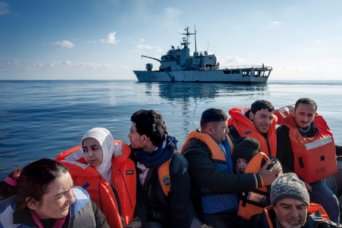- About
- Topics
- Picks
- Audio
- Story
- In-Depth
- Opinion
- News
- Donate
- Signup for our newsletterOur Editors' Best Picks.Send
Read, Debate: Engage.
"Open borders are the simplest and most effective way to help asylum seekers."
This is what migration researcher François Gemenne told German magazine Stern in an interview last weekend.
Gemenne, a migration specialist who lectures at Sciences Po and the Free University of Brussels, argues that opening or closing borders have no influence over whether desperate migrants choose to make their journeys.
"The difference is, however, whether they arrive alive or dead."
The failed border security operation Triton is tragic proof of his theory: when the EU cut funding to rescue operations last year, politicians postulated that this would stop asylum seekers from making dangerous attempts to reach Europe. Instead, the number of arrivals increased, and, thanks to the funding cut, the number of migrants dead in the Mediterranean increased, too.
Gemenne says the ineffectiveness of closed borders is evident worldwide.
"Another example," he explains in the interview, "the wall between the US and Mexico.It has not changed the number of Mexican immigrants."
"The same goes for the opening of the border between India and Nepal. The will to emigrate depends on structural factors that are beyond any migration policy: poverty, hunger, war.
"If we allow people to come by plane or ferry, they will not have to drown in the sea."
And yet, the EU has invested almost 1.3 billion EUR in border control and defense against migrants since 2009.
Gemenne says directing resources towards border control is a waste of money.
"Ever the idea to try to control or restrict migration is absurd. These are people who run for their lives. And no border in the world will stop them in their fear of death."
"Then there are those who are sent to allow their family or community a better life," he explains. " These people have often saved money for years. The survival of many people depends on them - they can also not be stopped by any border."
"What will increase in the future, is migration due to changing environmental conditions. Climate refugees. We must finally rethink and accept migration as part of our reality."
"We still haven't internalized the idea that migration is a part of our reality - and a fundamental right of every human being."
